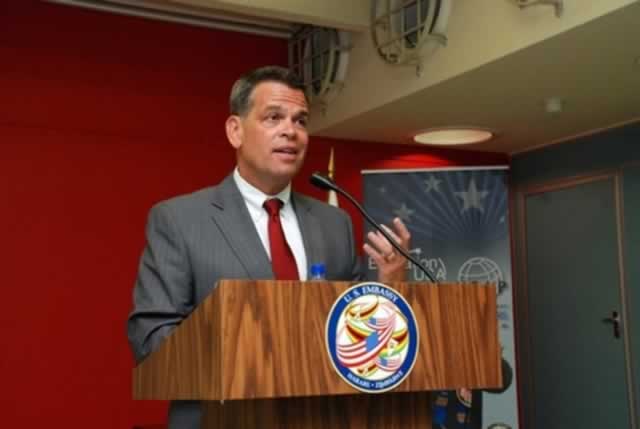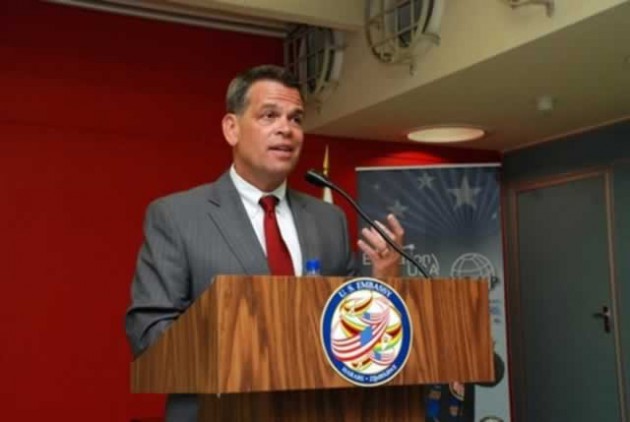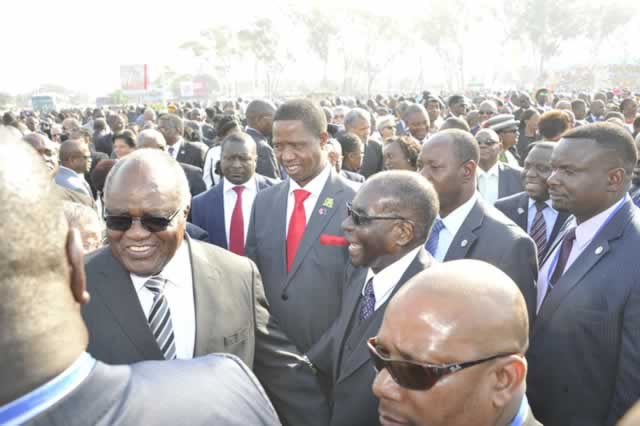US fully behind regime change bid in Zim

Benny Tsododo Correspondent
With overwhelming evidence pointing to the United States’ ploy to foist regime change in Zimbabwe, it is somewhat condescending for that country’s ambassador Bruce Wharton to deny his country’s unquestionable culpability.
In an interview with NewsDay last week, Ambassador Wharton said his country had never followed any regime change policy on Zimbabwe.
He was quoted saying; “No! No! What we want for Zimbabwe is for its people to determine their own future. We happen to practise regime change in the US every four to eight years. We think it is a good thing that there be a dynamic political system. But we are not going to dictate to Zimbabwe how it should manage itself only that certain fundamentals like rule of law, respect for human rights, property rights and a clear and credible election system, are fundamental to building confidence in the country and helping to grow the economy, and allow the people of Zimbabwe to build the future they want.”
Really, does the US want Zimbabweans to determine their own destiny?
If the US sincerely wants the people of Zimbabwe to decide their future, why has it put in place measures and institutions to sway the people’s electoral choice or incite them into civil disobedience?
It is not a secret that the United States imposed illegal economic sanctions on Zimbabwe through ZIDERA, the purpose of which was to create the debilitating economic situation currently gnawing at Zimbabweans with the explicit intent to jolt them into voting out ZANU-PF or rise up against their Government.
In addition to the debilitating embargoes, the US has sponsored political and civic group organisations to push the regime change agenda.
No one can dispute that the parentage and source of funding for the MDC formations is the US and its European bedfellows.
The same cabal is also behind the founding and funding of a plethora of civic society organisations that are promoting a regime change ideology in Zimbabwe. Pseudo civic society groups such as Crisis in Zimbabwe Coalition, Zimbabwe Institute for Democracy and others easily come to mind.
It is also not a coincidence that the so-called global media, meaning US-controlled media organisations, are daily vilifying President Mugabe and his Government.
This is all part of a grand scheme to bring down President Robert Mugabe and his Government and replace him with a regime pliable to the whims of the US.
With all this evidence weighing against the US, it cannot be lost on the reader that Ambassador Wharton is not being honest in saying that his country wants Zimbabweans to determine their future.
To further hedge his country against any blame, Ambassador attempted to wave the usual financial support card, saying his country had been assisting Zimbabwe with financial assistance since Independence in 1980.
He said; “We can always do more and we continue our long term support to the people of Zimbabwe, a commitment we made in 1980 at independence and we have brought in about $2.6 billion worth of assistance to this country since then.”
So, does this support mean the US has no ill-will against Zimbabwe? No!
We call upon Ambassador Wharton to weigh his country’s supposed $2.6 billion support to Zimbabwe against the $42 billion injury his country’s sanctions have caused to our economy.
Yes, pundits are agreed that the 14-year old illegal sanctions on Zimbabwe have bled the economy to the tune of $42 billion.
Compared with the 35-year old $2.6 billion US financial support given to Zimbabwe, the devastating costs of sanctions have outrun the benefits of the financial support, making it rather naught for Ambassador Wharton to keep on waving the financial support card as evidence of his country’s commitment to Zimbabwe.
Ambassador Wharton, you cannot console your neighbour by telling her that you once provided her with building materials to construct the home you are burning down.
Sanctions were imposed on Zimbabwe to hasten prospects of regime change by portraying the ZANU-PF Government as having run down a once vibrant economy.











Comments